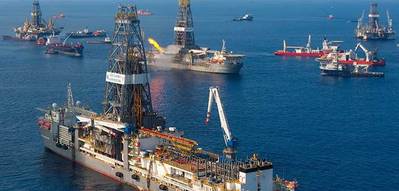BP 'Grossly Negligent' in 2010 US Spill, Fines Could Be $18b
A U.S. judge has decided that BP Plc was "grossly negligent" and "reckless" in the Gulf of Mexico oil spill four years ago, a ruling that could add nearly $18 billion in fines to more than $42 billion in charges the company took for the worst offshore environmental disaster in U.S. history.
BP said it would appeal Thursday's ruling by U.S. District Judge Carl Barbier in New Orleans, Louisiana, who held a trial without a jury last year to determine who was responsible for the April 20, 2010 rig explosion and spill that killed 11 workers and spewed oil for nearly three months onto the shorelines of several states.
Barbier ruled that BP was mostly at fault and that two other companies in the case, Transocean Ltd and Halliburton , were not as much to blame. The disaster struck when a surge of methane gas known to rig hands as a "kick" sparked an explosion aboard the Deepwater Horizon rig as it was drilling the mile-deep Macondo 252 well off Louisiana.
Barbier has yet to assign damages from the spill under the federal Clean Water Act or say how many barrels spilled, but David Uhlmann, a University of Michigan law professor and former chief of the Justice Department's environmental crimes section, said the ruling "dramatically increases" BP's liability for civil penalties under the act.
Previous calculations by Reuters have shown fines could run to $17.6 billion in the costliest scenario under a 'gross negligence' finding. The amount is far more than what the maximum fine could have been under a simple 'negligence' ruling - just $4.5 billion.
"The Court concludes that the discharge of oil 'was the result of gross negligence or willful misconduct' by BP," Barbier said in his written ruling. "BP's conduct was reckless."
In response, BP said it would challenge the ruling because the standard for proving 'gross negligence' was not met. "BP believes that an impartial view of the record does not support the erroneous conclusion reached by the District Court."
A criminal case was settled with the U.S. government in late 2012. BP agreed to pay $4.5 billion in fines.
Dividend Safe for Now
The case will go on for months or even years with Barbier set to assign damages after a third phase of the civil trial over the accident, scheduled for January 2015. The two earlier phases of the trial looked at how to apportion blame and the second phase examined how much oil spilled.
Shares of BP in the United States fell 5 percent to $45.31, eroding about $8.8 billion of market value. BP shares in London closed down nearly 6 percent, the worst one day slide in more than four years.
BP has already been forced to shrink by selling assets to pay for the cleanup. Those sales erased about a fifth of its earning power and it may be pressured by investors to delay making new investments until the lawsuit is resolved.
In addition to the court case, Philip Adams, analyst at Gimme Credit, said BP is vulnerable to growing tensions between the West and Russia. London-based BP holds a 19.75 percent stake in Russian energy giant Rosneft.
Still, the company had $27.5 billion in cash and equivalents on its balance sheet at the end of the second quarter, and analysts think it will keep paying dividends that yield about 5 percent.
Jason Gammel, an equity analyst at Jefferies in London wrote that even with a maximum fine, BP has sufficient liquidity to meet its obligations. "We would expect a lengthy appeals process first. We thus do not believe there is risk to the current BP dividend."
BP has set aside only $3.5 billion for fines under the Clean Water Act, part of a much broader series of provisions it has taken that exceed $42 billion.
Partners Protected
Under federal rules, a gross negligence verdict carries a potential fine of $4,300 per barrel, far higher than the statutory limit on a simple "negligence" of $1,100 per barrel.
BP says 3.26 million barrels leaked from the well and the U.S government says 4.9 million barrels spilled. The fines will exclude about 810,000 barrels collected during cleanup.
The judge apportioned 67 percent of the fault to BP, 30 percent to Transocean, which owned the drillship, and 3 percent to Halliburton, which did cement work on the Macondo well.
Transocean and Halliburton had already limited some of their liability from the spill by reaching settlements.
Barbier is set to assign damages after a third phase of the civil trial, scheduled for January 2015.
Even after the Clean Water Act fines are set, BP may face other bills from a lengthy Natural Resources Damage Assessment, which could require BP to carry out or fund environmental restoration work in the Gulf, and other claims.
Earlier this year, the U.S. Environmental Protection Agency lifted a ban it imposed on BP in late 2012 that excluded it from bidding on new leases in the Gulf of Mexico or acquiring new contracts to supply fuel to the U.S. military.
The civil case is In re: Oil Spill by the Oil Rig "Deepwater Horizon" in the Gulf of Mexico, on April 20, 2010, U.S. District Court, Eastern District of Louisiana, No. 10-md-02179.
(By Anna Driver and Mica Rosenberg; Additional reporting by Sudip Kar-Gupta and Karolin Schaps; Writing by Terry Wade; Editing by Grant McCool)











